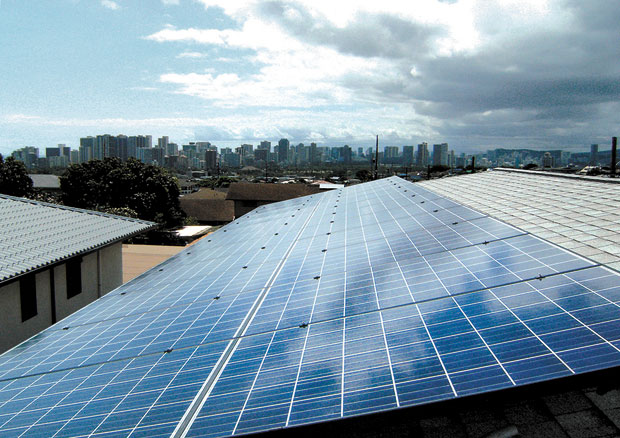Pacific Islands Solar has found that there are many things one should know prior to choosing a photo-voltaic system. Knowledge about the company’s product, its reliability and its history can tell you a lot about what to expect.The following information about Kyocera Solar Company and its product is provided for your review.
Kyocera has been in the solar industry for more than 37 years. Most companies have been in solar for less than 10 years and are offering product warranties for 25 years. Kyocera is one of the only companies that has modules in place for more than 25 years, and these modules are producing more than 90 percent of their original output. This means they have experienced very little degradation. How can companies with such short track records make claims about the long-term reliability of their product without a reasonable proof of performance?
Kyocera is one of the only solar module manufacturers that made a profit last year for the sale of PV modules. Most other module manufacturers experienced heavy financial losses over the last couple of years due to Chinese manufacturers flooding the market with low-cost products. Lost profits have translated to poor-quality materials and workmanship with less quality control. Kyocera has not followed the ways of its competitors, and has instead introduced higher quality frames to keep its products at the top for product reliability.
Independent testing by companies like TUV Rheinland and the Fraunhofer institute has confirmed that when Kyocera modules are tested in more extreme conditions than industry standards, their quality exceeds that of other companies.
A recent article in the New York Times expressed concern in the industry that many solar modules being installed today have defects and a short life expectancy. For consumers, this is bad news, especially for warranties. Most consumers never see the warranty until after their purchase, and then it is too late when they realize the paper is worthless.

Kyocera has never had a module returned for being defective in Hawaii in the 10 years that its products have been installed here. This is quite remarkable, especially with Hawaii’s conditions being so harsh on modules. Kyocera has been the highest performing module in Australia at the Dessert Knowledge Facility, where more than 20 modules are being tested. The facility took modules independently of the manufacturer’s knowledge so as to ensure they were not given higher, beforehand tested modules to test. What is surprising about the results is that many supposedly high-efficiency modules are not as efficient as companies claim.
Kyocera follows the Kaizen philosophy of continual improvement, or making change for the better. Most companies try to make their products more profitable and look at the bottom line as the key to their success. Kyocera feels that making a cheaper product is not the most important measure to achieve. Making a commitment to continual improvement to a higher-quality product provides the best value in the end to the consumer. As the company says, “Others will make cheaper products, but no one will make a better product than Kyocera.”
In the average household, there are more than 250 components made by Kyocera, which other manufacturers use to make their products. Kyocera may not be the best known company in the U.S., but the brand’s loyalty to quality affects you every day with these products in your home.
Pacific Islands Solar is the only Kyocera Diamond installer in Hawaii, having demonstrated its full attention to quality installations by using only the best equipment and installation practices. The company provides a free five-year service package with installation that cleans and inspects your system every year to ensure your system is being maintained.
PACIFIC ISLANDS SOLAR
contact // 841-7756
web // Pacificislandsconstruction.net
See more articles from: Pacific Islands Solar